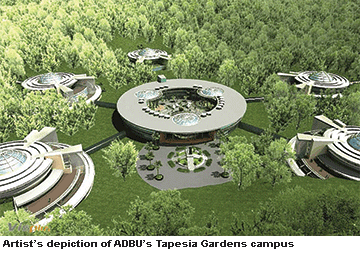Established by special legislation passed by the state government in 2009, the Assam Don Bosco University is set to shake the groves of academia and impact the North-east upon the global academic map
.gif) ALTHOUGH CHRISTIAN missionary education institutions have educated millions of children and youth of all creeds out of all proportion to the number of Christians in post-independence India, latter day schools and colleges run by men of the cloth tend to be languorous institutions defined by rock-bottom tuition fees, crumbling infrastructure, obsolescing syllabuses, tight budgets and abject dependence on government grants. But a chance visit to the Don Bosco College of Engineering & Technology, Guwahati — a well-reputed engineering college in Assam — resulted in the discovery of a higher education institution of great pith and moment which is likely to shake the somnolent groves of Indian academia and impact Assam and North-east India upon the academic map of the world.
ALTHOUGH CHRISTIAN missionary education institutions have educated millions of children and youth of all creeds out of all proportion to the number of Christians in post-independence India, latter day schools and colleges run by men of the cloth tend to be languorous institutions defined by rock-bottom tuition fees, crumbling infrastructure, obsolescing syllabuses, tight budgets and abject dependence on government grants. But a chance visit to the Don Bosco College of Engineering & Technology, Guwahati — a well-reputed engineering college in Assam — resulted in the discovery of a higher education institution of great pith and moment which is likely to shake the somnolent groves of Indian academia and impact Assam and North-east India upon the academic map of the world.
Currently, the Assam Don Bosco University (ADBU), which was established by a special Assam Don Bosco University Act, 2009 passed by the state legislative assembly four years ago, has two colleges — the Don Bosco College of Engineering & Technology (DBCET, estb. 2008) housed on the five-acre Azara campus near Guwahati airport, and the Don Bosco Institute of Management (DBIM, estb.2009), sited on the 1.5- acre Kharguli campus in the Ramsai Hills. The former has 1,600 students, and the latter 80 on their muster rolls. But 10 km from Guwahati, a mint-new ADBU campus, breath-taking in scale and imagination, is taking shape in Tapesia Gardens, a 500-acre tea estate likely to dwarf all higher education institutions in the North-east and perhaps countrywide.
Sprawled over 50 green acres carved out of the tea estate, ADBU will comprise a 150,000 sq. ft main concourse surrounded by eight clusters housing 30 schools/faculties. Funded by the multinational network of the Rome-based Don Bosco Society — actively engaged in education and social activism in 132 countries worldwide — ADBU’s state-of the-art Tapesia Gardens campus will admit the first cohort of social science students (social work, psychology, education, human rights, mass communications) in 2015-16. Moreover the Tapesia campus is being prepared to become the hub of carefully designed, far-reaching business management, information technology and computer applications postgrad Mooc (massive open online courses) programmes. 
“I am confident the academic profile of Assam and the North-east is set to change with the promotion of ADBU, and particularly the inauguration of our new ecologically-sensitive campus in Tapesia Gardens next year. We are taking great pains to design and develop the university’s Tapesia Gardens campus because we intend to attract students and faculty not only from mainland India but from around the world. In particular, in the wake of the Central government’s new Look East commerce and trade diplomatic initiatives, we have started to develop close ties with higher education institutions in South-east and East Asian countries and forge lively students and faculty interactions and exchanges with them,” says Fr. (Dr.) Stephen Mavely, vice chancellor of ADBU which currently has an aggregate enrollment of 1,700 students and 175 faculty and the capacity to accommodate 6,000 students and staff on its completed Tapesia Gardens campus. A highly-qualified alumnus of St. Xavier’s College, Mumbai, North Bengal University, NEHU (North Eastern Hill University) and the Salesian Pontifical University (Rome), California University, and former principal of the North-east’s top-ranked St. Anthony’s College (1986-2002), Mavely was appointed vice chancellor-designate of ADBU in the millennium year 2000.
Although dr. mavely is tight-lipped about the self-evident huge investment already made in ADBU and its Tapesia Gardens campus in particular — involving the purchase of an entire 500-acre tea estate from the Kamrup-based Sonapur Tea Co. Ltd — it’s clear this huge project, which will require an additional Rs.350 crore over the next five years, is the outcome of an unprecedented transnational fundraising effort to which the Catholic Bishops Conference of Italy, the Salesians of Don Bosco, Rome, the Leopold Bachmann Foundation, Zurich, and several other foundations in the Netherlands and Switzerland, have made handsome contributions.
However despite the massive capital invested in this state-of-the-art university which is slated to revolutionise higher education in North-east India and beyond, the varsity has devised a modest fees structure (social sciences: Rs.27,500 per year; engineering: Rs.55,000; and business management: Rs.1.33 lakh) “because we don’t have to pay a return on capital investment”. Moreover, uniquely the remaining 450 acres of the Tapesia Gardens tea plantation will continue to be run as a for-profit business enterprise which will contribute to the operational and maintenance expenses of ADBU.
Unheralded, this monumental education enterprise of great potential which offers the promise of changing the education landscape of North-east India — and perhaps mindsets within mainland India — is silently taking shape and form in Assam’s remote Kamrup district. All right-thinking people will surely wish it God speed.